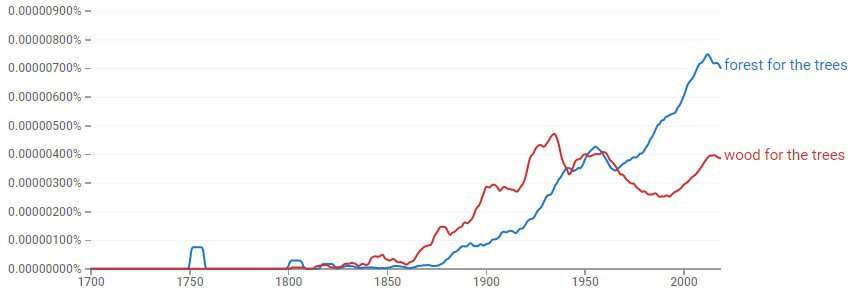To say the idiom cannot see the forest for the trees means that a person or organization cannot see the big picture because the focus is too much on the details. It would be like someone needing to paint an entire house in one day, but spending half the day on picking out the right color.
Origin of the Term

The first known publication of a form of the term dates back to a Renaissance proverb collection written by John Heywood in 1546.
Published in London, it states “from him who sees no wood for trees/ And yet is busie as the bees/ From him that’s settled on his lees/ And speaketh not without his fees”.
This was considered a political statement during the reign of Charles II and was critical of the current Pope, whom he felt was unable to see the issues plaguing the people due to being more concerned with money.
The word “wood” was quickly replaced with the less poetic term “forest”, and not widely used again until the 1800s. This explains how both words are used interchangeably within the phrase.
Synonyms
As mentioned, the phrase is not complimentary when directed at an individual or a group of people. It didn’t originate as a positive message either, and the meaning has stayed true to its use.
When you use it, you are suggesting that the recipient of your ire is confused, perplexed, bewildered by information, is unable to think straight, or is unable to get something done or make a decision.
It also can hint at an insult, and suggest that this is due to selfishness or a lack of intelligence concerning the topic.
Proverbial Tree Falling In The Forest
A related phrase is the proverbial tree falling in the forest. Proverbial means related to an idiom. The tree this is speaking of is the philosophical question: if a tree falls with no one to hear it does it still make a sound? The idea is that a sound is heard so if there is no one to hear it, does the sound still exist?
Occasionally the phrase proverbial tree will refer to the first idiom, or to another phrase involving a tree. For clear meaning it is best to use the full phrase falling in the forest.
Examples In A Sentence
Abe criticizes the opposition camp for not seeing the forest for the trees in its attempt to highlight the dangers for SDF members. [The Japan Times]
I’m not sure I even want to be a smart man if it means getting so focused on the trees that I can’t see the forest. [Wealth Daily]
The answer is not that difficult if one would stop looking at the proverbial tree, but stand away and look at the forest instead. [The Hill]
The Qatar-owned cable news network is, though, the proverbial tree in a forest that implodes with no one around to hear. [Breitbart News]
Let’s Review
To use cannot see the forest for the trees, can’t see the forest for the trees, or can’t see the wood for the trees, you are not paying a compliment to the recipient.
This is an idiomatic phrase that brings to light an opinion that some major information (the entire forest) is being missed, and that perhaps it is due to either confusion and lack of understanding, or possibly even selfishness.
